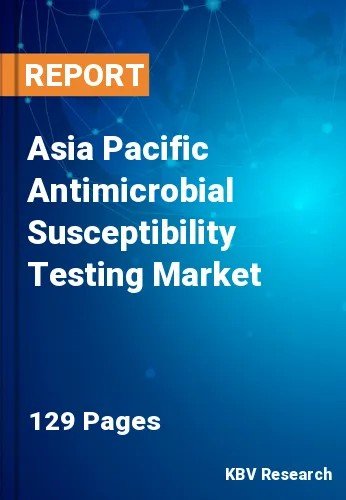The Asia Pacific Antimicrobial Susceptibility Testing Market would witness market growth of 6.4% CAGR during the forecast period (2022-2028).
Antimicrobial susceptibility testing devices that are automated are packed with advanced capabilities and are expensive. Moreover, automated antimicrobial susceptibility testing methods offer several benefits, including shortened detection time and testing precision, among others. In addition, antimicrobial susceptibility testing (AST) strives to guarantee that appropriate antibiotics are provided to affected persons and helps to discover resistance isolates with defined resistance mechanisms for infection prevention and control, driving the market growth.
An increasing number of harmful bacteria are developing antibiotic resistance, and new forms of resistance are constantly appearing, necessitating antimicrobial susceptibility testing (AST) as a matter of urgency. Rapid multiplexed AST platforms offer minimum inhibitory concentrations (MICs) within hours at a reasonable cost, enabling rapid determination of effective targeted therapy, resulting in shorter hospital stays, fewer laboratory tests, and a decrease in morbidity, mortality, and associated healthcare costs.
Antimicrobial resistance is being accelerated by the overuse and misuse of antimicrobials by humans and the agricultural sector. With 14 ministries, China released a 2016–2020 One Health National Action Plan to Control Antimicrobial Resistance to establish a clear, multi-sectoral approach to addressing this expanding problem. Hospital inpatient use of antimicrobials has decreased in China due to health officials' efforts, with rates falling from 59.4% in 2011 to 36% in 2019. The antimicrobial susceptibility testing market is anticipated to expand in the region due to the measures taken by the governments of the regional countries.
The China market dominated the Asia Pacific Antimicrobial Susceptibility Testing Market by Country in 2021, and would continue to be a dominant market till 2028; thereby, achieving a market value of $372.2 million by 2028. The Japan market is estimated to grow a CAGR of 5.7% during (2022 - 2028). Additionally, The India market would experience a CAGR of 7% during (2022 - 2028).
Based on Application, the market is segmented into Clinical Diagnostics, Drug Discovery & Development and Epidemiology & Others. Based on Method, the market is segmented into Automated Susceptibility Testing Instruments, Disk Diffusion, Etest Method, Agar Diffusion, and Genotyping Method. Based on Type, the market is segmented into Antibacterial, Antifungal, Antiparasitic, and Others. Based on End User, the market is segmented into Hospitals & Diagnostic centers, Pharmaceutical & Biotechnology Companies, Research & Academic Institutes, and Clinical Research Organizations. Based on Product, the market is segmented into Automated Laboratory Instruments, Manual Laboratory Instruments, Culture & Growth Media and Consumables. Based on countries, the market is segmented into China, Japan, India, South Korea, Singapore, Malaysia, and Rest of Asia Pacific.
Free Valuable Insights: The Worldwide Antimicrobial Susceptibility Testing Market is Projected to reach USD 4.9 Billion by 2028, at a CAGR of 5.9%
The market research report covers the analysis of key stake holders of the market. Key companies profiled in the report include BioMérieux S.A., Becton, Dickinson and Company, Thermo Fisher Scientific, Inc., Danaher Corporation, Bio-Rad Laboratories, Inc., Merck KGaA, Bruker Corporation, Accelerate Diagnostics, Inc., HiMedia Laboratories Pvt. Ltd., and F. Hoffmann-La Roche Ltd.
By Application
By Method
By Type
By End User
By Product
By Country
Our team of dedicated experts can provide you with attractive expansion opportunities for your business.

